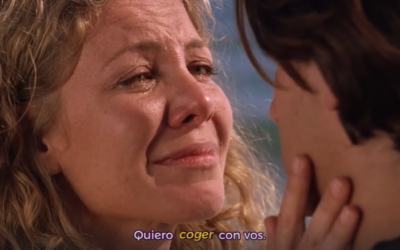
When it comes to submitting a film to festivals, the submission deadlines often work against the team, eading to the mistake of sacrificing crucial aspects just to make it in time. The most common mistake is to translate the film hastily just to submit the subtitles required by the festival. This, besides damaging the image is actually making you lose at the last minute everything you have invested in it. Whether it is your time, money, or effort.
Case Study: Subtitle Translation for the Málaga Film Festival
A few weeks ago, the production company Fishcorb Films n contacted us to translate the subtitles (from English to Spanish) of their documentary Searching for Nika. The order required a certain level of urgency because it is a documentary that contains a lot of text, and the registration deadline of the festival they wanted to enter was approaching. As we faced a few localisation challenges within that tight deadline, we realised once again the tremendousdifference that relying on expert translators can make during the process of internationalising a work.
The client’s ultimate goal was the following: to allow the documentary, which had its American premiere in DOC NYC 2023, to make it to the Málaga Film Festival and be understood by the Spanish-speaking audience.
After days of intense work, unravelling and understanding each of the tragic stories that make up the documentary, the production company was able to successfully submit it for consideration, and our team felt great satisfaction and pride. Let’s analyse a specific example to learn from this case study.
The Importance of Context When Subtitling
In a dramatic scene from the documentary, a Ukrainian veterinarian explains the helplessness she feels on the days when bombs fall and there is nothing they can do about it. She sums it up like this:

Let’s compare a literal translation of “lying down” with the translation adapted to the context made by the Ponle Subtítulos team:

In order to accurately reflect the veterinarian’s helplessness we talked about, it is necessary to know the figurative meaning that this expression holds in English. It is an idiom:

If we ignore the context of this scene and simply translate the literal meaning of the original expression,we will be ignoring that “lying down”, besides referring to the act of resting on one’s back, in this context means not being able to do anything but “to give up” or, if we want to use an idiom in Spanish too: “quedarse de brazos cruzados”.
Conclusions
What can we learn from this case study? First, 1. abandon the idea that the translation of a film is not that important and will not affect its career. If your film is going to be screened in front of an audience or a jury that doesn’t understand its original language, getting them to understand all its nuances and empathise with the message you want to convey will be vital. Second, 2. do not assume it’s too late before consulting the delivery deadline with the translators. There are audiovisual translation agencies like ours that can start working with the very WIP version of the project to speed up the process and will try to help you meet that seemingly impossible deadline. It’s better to ask for help than to resort to quick options that damage the film’s image. Third, 3. we love it when a client is happy with our work!
“They have translated the subtitles for our documentary and the service, caring assistance and result were more than satisfactory. If another opportunity arises, we will definitely work with them again. It’s a pleasure!”. (Irene Soms, Production Coordinator at Fishcorb Films).
Do you work in the audiovisual world and are looking to distribute a film, short film, or documentary? Are you planning to subtitle it in one or more languages different from the original? Get in touch with us!



